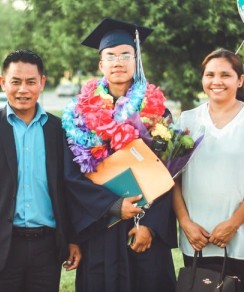There are many barriers to solving inequities within colleges, and some of them may stem from leaders of a college community that is “raised” within the same system.
College leaders carry forward past assumptions about college and the college experience—assumptions that limit our understanding of the problems of inequity. However, these leaders are not without resources to improve the chances of overcoming inherited assumptions. There are opportunities to learn from first-generation students and from first-generation college graduates within the ranks of college administrations.
College completion remains unequally distributed across racially minoritized groups. Therefore, the enrollment and persistence of first-generation students should be a critical focus for all postsecondary schools. Without improving the enrollment and graduation rates of racially minoritized students, this population will continue to suffer from higher unemployment and lower earnings.
When the mission as a college administrator is to break down the barriers for underserved populations and increase enrollment, one needs to be creative and have a flexible vision of what college is to see all the possibilities.
It can be argued that first-generation students do not suffer the same limitations because they experience college as it really is and not the nostalgic version passed down by parents with degrees. As college “insiders,” leaders tend to be sensitive to a college’s “climate” and the values it represents, focusing on engineering more personal connections to replicate their own experiences. However, more is required.
First-generation students are less focused on the trappings of tradition and culture and more concerned with the mechanics of college, which really determines their survival. Leaders who fail to recognize this fact when establishing cohorts and mentoring programs may cause even greater barriers for first-generation and racially minoritized students. Leaders tend to ignore the machinery of college: semesters, credit hours, schedules, and faculty hours. But for underserved students, this machinery is their immediate concern.
Leaders tend to ignore the machinery of college; but for underserved students, this machinery is their immediate concern.
The elaborate apparatus that structures students’ time and studies benefits the college more than the first-time student. For example, a closed enrollment system that limits entry during a 16-week semester confines the access of first-time students when they need it. And often this most impacts students who do not have the luxury of waiting to enroll and then waiting again for specific courses to be offered in future semesters in order to graduate. This arbitrary structure of delaying service preserves a college tradition and creates a lengthy barrier to a student’s ultimate success.
What are some other possible barriers? It is hard to imagine from the inside.
What are some other possible barriers? It is hard to imagine from the inside.
What is required is an extrinsic examination of the college experience, a perspective only available to first-generation graduates who, through their own self-reliance and sheer persistence, survived the college experience. Colleges would benefit from need-based surveys and focus groups that first-generation students participate in prior to enrollment, during each year of study, and, most importantly, after graduation. No college leader should assume he or she has adequately served first-generation students just because these students have graduated.
A deeply institutionalized issue such as inequity requires deeper, structural solutions. The prerequisite experience of first-generation graduates provides fresh institutional understanding of the barriers that prevent successful outcomes for this disadvantaged population without any cumbersome attachment to the past. From that viewpoint, sustainable solutions may be imagined.
Jennifer Billingsley is an Engaging Excellence in Equity Fellow who has participated in convenings designed to identify culturally responsive practices and further support-building evidence and capacity for this work. Learn more about this project.
